必修四unit1warming up and reading
- 格式:pptx
- 大小:124.65 MB
- 文档页数:44
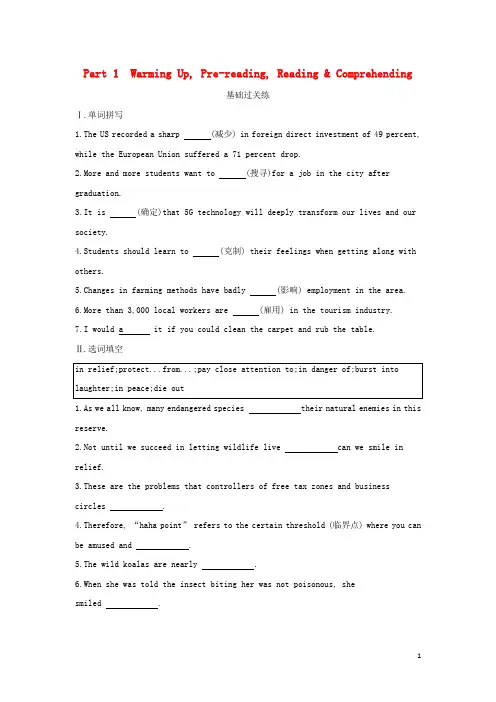
Part 1 Warming Up, Pre-reading, Reading & Comprehending基础过关练Ⅰ.单词拼写1.The US recorded a sharp (减少) in foreign direct investment of 49 percent, while the European Union suffered a 71 percent drop.2.More and more students want to (搜寻)for a job in the city after graduation.3.It is (确定)that 5G technology will deeply transform our lives and our society.4.Students should learn to (克制) their feelings when getting along with others.5.Changes in farming methods have badly (影响) employment in the area.6.More than 3,000 local workers are (雇用) in the tourism industry.7.I would a it if you could clean the carpet and rub the table.Ⅱ.选词填空1.As we all know, many endangered species their natural enemies in this reserve.2.Not until we succeed in letting wildlife live can we smile in relief.3.These are the problems that controllers of free tax zones and businesscircles .4.Therefore, “haha point” refers to the certain threshold (临界点) where you can be amused and .5.The wild koalas are nearly .6.When she was told the insect biting her was not poisonous, shesmiled .7.Lots of animals are disappearing from the earth with people hunting them more and more often.Ⅲ.单句语法填空1.The trees form a natural (protect)against the sun's rays.2.The (lose) of some endangered animals will destroy the balance of nature.3.To our (relive), these endangered species are under the protection of the local government.4.China has been attaching high (important) to developing the seed industry to ensure food security.5.A vaccine is a (power)weapon against the pandemic.6.To our joy, Chang'e 5 returned to the earth with lunar soil (successful).7.The heavy schoolwork burden is (harm)to teenagers' health.Ⅳ.课文语法填空Daisy had always longed to help endangered species of wildlife. One day she woke up and found a 1 (fly)carpet. She asked it to take her to a 2 (distance)land where she could find the animal that gave fur to make her sweater. At once the carpet flew away and took her to Tibet 3 Daisy saw an antelope looking sad. The antelope told her that they were being killed for the wool and that as 4 result, they were an endangered species.Then the carpet took Daisy to Zimbabwe where Daisy found that she 5 (watch)by an elephant. The elephant told Daisy that farmers used to hunt them 6 mercy, but afterwards the government took some measures 7 (save)the wildlife. The carpet rose again and almost at once they were in a thick rainforest. She was amazed to find a monkey protecting 8 (it)from mosquitoes by rubbing a millipede insect over its body. The insect contains a 9 (power)drug which affects mosquitoes.When Daisy woke 10 , everything disappeared, but Daisy learned a lot. 1. 2. 3. 4. 5.6. 7. 8. 9. 10.能力提升练Ⅰ.阅读理解A(2021河南名校联盟高一上期中,)New research suggests that human beings may have been partly responsible for the disappearance of cave bears thousands of years ago, when the plant-loving animals lived. Some experts believed that the cooling climate during the Ice Age was to blame for their extinction.Scientists reported last week they had studied genetic data from 59 cave bears. Their bones were recovered from seven countries: France, Germany, Italy, Poland, Serbia, Spain and Switzerland. From the genetic information, the scientists noted a decrease in the cave bear population beginning about 50,000 years ago. That is around the time of the arrival of Homo sapiens (现代人), or modern humans, in Eastern Europe. The researchers said they observed a sharp drop in the bears' numbers about 40,000 years ago. That coincides with(与……同时发生) the spread of Homo sapiens throughout Europe.The animals disappeared about 20,000 years ago. The cave bear lived in the Ice Age at the same time as other now extinct creatures. The bear was as big as a modern polar bear, but ate only plants. It appears often in prehistoric(史前的) cave paintings.There has been a scientific debate about what led to the extinction of the cave bear. Some scientists believe that the climate change greatly reduced the plants they needed, while others have blamed it on human activities, including hunting and taking over the caves where the bears gave birth and slept during winter. The bear's population remained largely unchanged for long periods before climate cooling, including during two noticeably cold periods and other cooling events.Homo sapiens appeared in Africa more than 300,000 years ago and later moved to other areas. The study offered new evidence that the arrival of Homo sapiens led to ruin for many kinds of animals across Eurasia, the Americas and Australia.1.How did scientists research on cave bears?A.By studying the bones found in some countries.B.By observing the paintings on the cave walls.C.By being told from generation to generation.D.By do research on the polar bears.2.When did the cave bear die out?A.About 50,000 years ago.B.About 40,000 years ago.C.About 20,000 years ago.D.More than 300,000 years ago.3.What can we learn according to the fourth paragraph?A.Sudden change in climate made cave bears die out.B.Cave bears couldn't adapt to the cold environment as quickly as possible.C.The loss of cave bears' habitats caused damage to their existence.D.Cold periods were very common thousands of years ago.4.Which of the following is the best title for the passage?A.Humans Are Perhaps Partly to Blame for Cave Bears' DisappearanceB.Homo Sapiens Hunting Kinds of Animals across EurasiaC.A Debate about Why Cave Bears Suddenly DisappearedD.Scientists Studied Bones Discovered in Seven CountriesB(2021河北邢台高一上期中,)It is widely believed that biodiversity (生物多样性) is promoted to save species. But in reality species exist only as part of ecosystems and cannot survive unless their ecosystems are protected along with the diversity they contain as much as possible.Protecting habitats is important for keeping biodiversity. In 2003, over 102,000 habitats covering nearly 19 million square kilometres, or 11.5% of theworld's land surface,were under some form of protection. Though this has been a great improvement since 1962, when just l,000 protected habitats were listed, it is still not considered enough to stop the ecocide that is endangering the world's biodiversity.For a number of environmentalists, protecting the world's 25 biodiversity hotspots(热点地区) is critical to saving habitats and species. But many hotspots are endangered already, having lost up to three-quarters of their original plants.The poor state of most biodiversity hotspots results directly from population growth and migration(迁移) into these areas. A study found that by the mid-1990s around 1.1 billion people had lived in these hotspots. Moreover, the annual population growth rate in these areas was 1.8%, higher than the global average of 1.4%. The PAI report concluded that human-related environmental changes would continue to put pressure on hotspots. Therefore, keeping biodiversity requires paying close attention to population size.Protecting hotspots is not simply a matter of putting up fences or employing guards. The best results will be achieved when local people are educated about the value of wildlife, and actually gain a share of the benefits from eco-tourism. Only then do they have a chance to see the benefits of protecting hotspots.5.What can we infer from Paragraph 1?A.The loss of any species can affect humans.B.Endangered species are paid more attention to by humans.C.Species can still survive when their ecosystems are destroyed.D.Ecosystem protection is as important as diversity protection.6.What does the underlined word “ecocide” in Paragraph 2 mean?A.Ecosystem protection.B.Reduction in the number of species.C.Serious damage to habitats.D.Habitat protection.7.What's the direct cause of the terrible state of the hotspots?A.Population growth in hotspots.B.Migration out of these areas.C.Global warming.D.The global average population growth rate.8.What's the author's opinion on protecting the hotspots?A.It's simple to carry out.B.It leads to the increase in tourists.C.It's closely connected with local people.D.It suggests that the local people be well educated.Ⅱ.七选五(2020山东德州高一上期末,)China has made great improvements in environmental protection during the past 70 years. 1 Each species on Earth has a role to play in the ecosystem.In recent decades,a series of wildlife-protection movements has been carried out by the central government. 2 The giant panda and the crested ibis(朱鹮) are among these successful stories.The giant panda used to have a population of 1,114 in the 1970s. It now totals 1,864 thanks to 52 protection areas. 3 By the end of last year, seven of the nine released pandas had survived in the wild. 4 In 1981,only seven crested ibises were found in Yang County,Shaanxi Province.Since then,breeding programs have helped the population reach 2,000. China has even sent crested ibises to Japan and South Korea in recent years to help with the species' survival.5 Key projects will be continually carried out to improveprotection,including making the lists of wild animals and plants under State protection,and also fighting against illegal wildlife trade, which includes the ivory(象牙)trade.A.Another species was once thought to be extinct.B.Protecting wildlife is, without doubt, an important part.C.China will continue its efforts in the wildlife protection.D.People call for immediate protection of the remaining species.E.Scientists have worked to feed pandas and then release them into the wild.F.As environmental damage has increased, signs of change have appeared around the world.G.Several species in danger of extinction have made impressive progress thanks to the methods.1. 2. 3. 4. 5.答案全解全析Part 1 Warming Up, Pre-reading, Reading &Comprehending基础过关练Ⅰ.1.decrease 2.hunt 3.certain 4.contain 5.affected6.employed7.appreciateⅡ.1.are being protected from 2.in peace 3.pay close attention to 4.burst into laughter 5.dying out 6.in relief 7.in danger ofⅢ.1.protection考查名词。
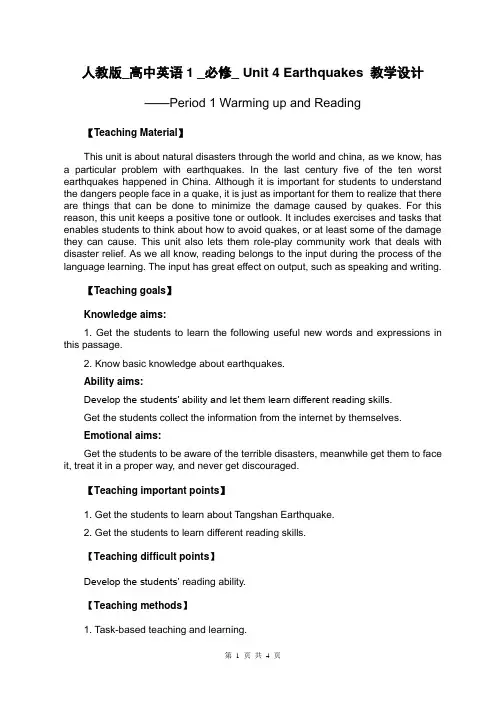
人教版_高中英语1 _必修_ Unit 4 Earthquakes 教学设计——Period 1 Warming up and Reading【Teaching Material】This unit is about natural disasters through the world and china, as we know, has a particular problem with earthquakes. In the last century five of the ten worst earthquakes happened in China. Although it is important for students to understand the dangers people face in a quake, it is just as important for them to realize that there are things that can be done to minimize the damage caused by quakes. For this reason, this unit keeps a positive tone or outlook. It includes exercises and tasks that enables students to think about how to avoid quakes, or at least some of the damage they can cause. This unit also lets them role-play community work that deals with disaster relief. As we all know, reading belongs to the input during the process of the language learning. The input has great effect on output, such as speaking and writing.【Teaching goals】Knowledge aims:1. Get the students to learn the following useful new words and expressions in this passage.2. Know basic knowledge about earthquakes.Ability aims:Develop the students’ ability and let them learn different reading skills.Get the students collect the information from the internet by themselves.Emotional aims:Get the students to be aware of the terrible disasters, meanwhile get them to face it, treat it in a proper way, and never get discouraged.【Teaching important points】1. Get the students to learn about Tangshan Earthquake.2. Get the students to learn different reading skills.【Teaching difficult points】Develop the students’ reading ability.【Teaching methods】1. Task-based teaching and learning.2. Fast reading, intensive reading3. Discussion.【Teaching aids:】CAI课件, A tape recorder【Teaching procedures】Step 1 Warming upWarming up by lookingShow Ss some pictures about natural disasters and ask them two questions.1. Can you tell some natural disasters?(volcano, fire, sandstorm, typhoon, hailstone, thunderstorm, flood, hurricane, earthquake)2. Have you ever experienced an earthquake? Can you describe how terrible an earthquake is?(The earth is shaking; all the buildings will fall down; many people will die; many children will become orphans.)Warming up by discussingNow, look at the pictures of Tangshan and San Francisco in warming up and describe what you see in the pictures.(Beautiful cities; broad roads; tall building; large population...)What will happen if there has been a big earthquake in these two cities?As we all know, earthquakes are disasters to everyone. But can we avoid or at least reduce the loss caused by earthquakes? Can we foretell earthquakes? Now let’s come to Pre-reading and decide what may happen before an earthquake comes.Step 2 Pre-readingImaging and sharingImagine there is an earthquake now. Your home begins to shake and you must leave it right away. You have time to take only one thing. What will you take? Is it money, water, fruits, mobile, phones, a torch light, or anything else? Why?Talking and sharingWhat are the signs of an earthquake? Talk about the pictures on Page 25.(e.g. Cows, pigs and dogs become too nervous too eat. The mice will run out of the fields looking for places to hide. The water in the wells will rise and fall. Walls of the wells in village will have deep cracks. There will be bright light in the sky….) Step 3 ReadingTell the students: Today, we are going to read a news report about the strongest earth-quake in China’s history, which happened in Tangshan, Hebei, in 1976.1. Fast readingAsk the students to read the passage quickly.1) Answer some questions.Ask the students to read the passage quickly and pay attention to the first sentence of each paragraph.2) Find out the topic sentences of each paragraph and get the general idea of the passage.3) Do some true or false exercises.Ask the students to decide whether the following statements are true or false. If it is false, try to correct it.2. Reading carefullyAsk the students to read the passage carefully to lacate particular information.1) Do the exercises in the part Comprehending on Page 27.2) Do some multiple choices.3. Language problemsWhile checking the answers with the whole class,deal with any language problems that the students can’t understand.4. Reading aloudPlay the tape of the passage for the students to listen and follow. Then play the tape of Paragraph 1 of the passage once more; this time the students listen and repeat.Step 4 GameWork in pairs. Supose you are a newspaper reporter, and other is a witness of the 1976 Tangshan Earthquake. Now the newspaper reporter is interviewing the witness.Step 5 DiscussionHow can we protect ourselves in the earthquake?Earthquake Survival TipsDriving --- pull over and stay in your car.In a building--- get near a strong wall / The corner of the room is the safest.Having classes--- listen to the teacher’s instruction, protect their heads and hide under the desks.On buses--- Grasp the handles to avoid being injured; lower the center of gravity; hide near the seats; get off after the earthquake passed.Step 6 HomeworkP review the reading “A Night the Earth didn’t Sleep” and learn new words of this unit.。

⾼中⼈教版英语必修四Unit1-5同步练习题及单元检测题含答案【20份】2017年春⾼中⼈教版英语必修四Unit 1-5同步练习题及单元检测题含答案⽬录SectionⅠWarming Up,Pre-reading,Reading&Comprehending课时训练Ⅰ基础夯实Ⅰ.根据句意、汉语提⽰或⾸字母,写出单词的正确形式1.He is a little boy,but he b as if he were an adult.2.On summer afternoons,the old men sit in the s of the tree drinking tea.3.As we all know,WTO stands for World Trade O .4.I hope his success will i all of you to greater efforts.5.As we all know,Yuan Longping is a s in rice.6.China has made great scientific (成就) in outer space.7.A cinema is a public place of (娱乐).8.Through careful (观察) he found the secret of the birds’ life.9.He is an (直率的)person,and I like to make friends with him.10.After the violent (争论),an agreement was reached at last.Ⅱ.单句改错1.She was devoted to improve her spoken English.2.You have no time to get change because they are waiting for you.3.She argued me with buying that coat.4.After by this means can the problem be solved.5.All kinds of troublesome things crowded through my mind at the same time.Ⅲ.完成句⼦1.When your teacher doesn’t give you clearexplanations,you .当你的⽼师没有给你解释清楚问题时,你不应该跟他争论。
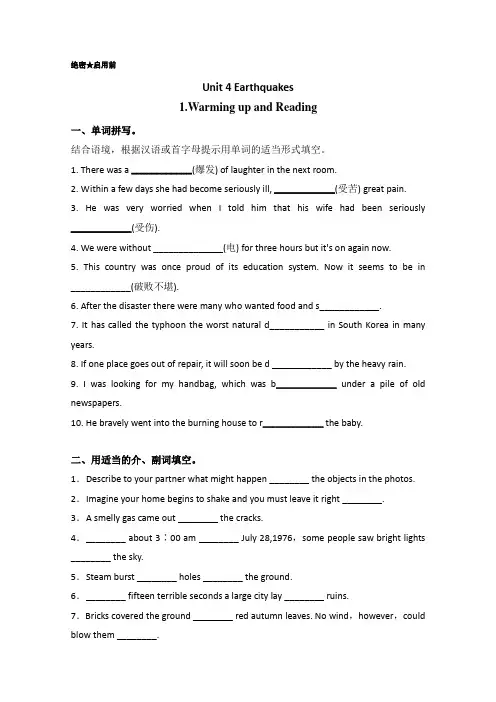
绝密★启用前Unit 4 Earthquakes1.Warming up and Reading一、单词拼写。
结合语境,根据汉语或首字母提示用单词的适当形式填空。
1. There was a ____________(爆发) of laughter in the next room.2. Within a few days she had become seriously ill, ____________(受苦) great pain.3. He was very worried when I told him that his wife had been seriously ____________(受伤).4. We were without ______________(电) for three hours but it's on again now.5. This country was once proud of its education system. Now it seems to be in ____________(破败不堪).6. After the disaster there were many who wanted food and s____________.7. It has called the typhoon the worst natural d___________ in South Korea in many years.8. If one place goes out of repair, it will soon be d ____________ by the heavy rain.9. I was looking for my handbag, which was b____________under a pile of old newspapers.10. He bravely went into the burning house to r____________ the baby.二、用适当的介、副词填空。
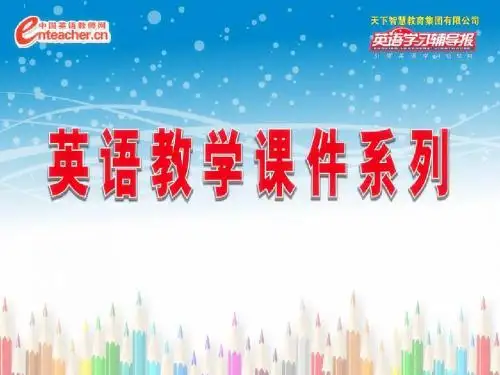
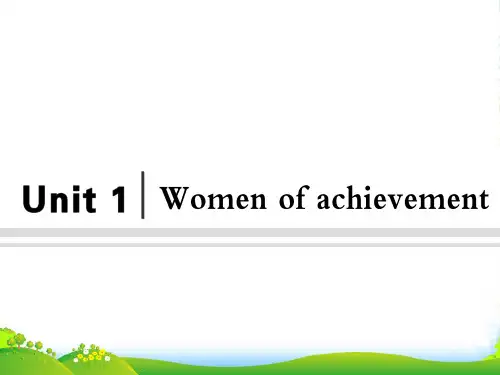
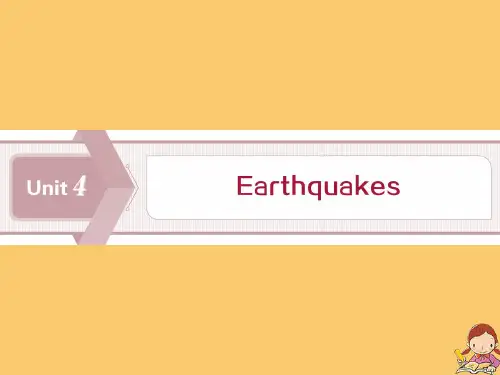
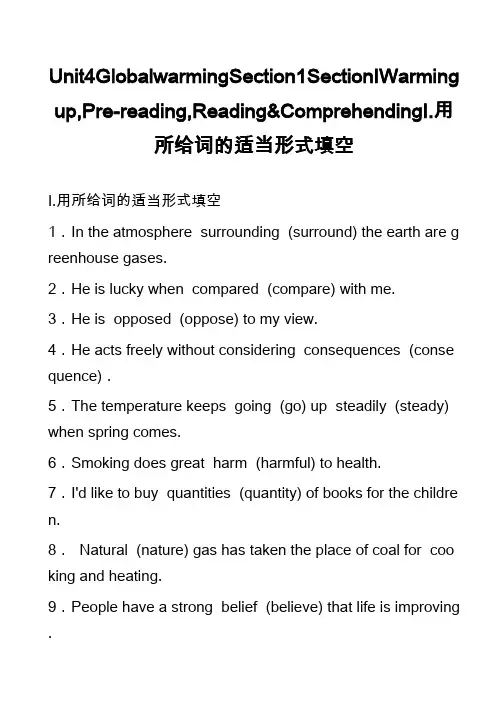
Unit4GlobalwarmingSection1SectionⅠWarming up,Pre-reading,Reading&ComprehendingⅠ.用所给词的适当形式填空Ⅰ.用所给词的适当形式填空1.In the atmosphere surrounding (surround) the earth are g reenhouse gases.2.He is lucky when compared (compare) with me.3.He is opposed (oppose) to my view.4.He acts freely without considering consequences (conse quence).5.The temperature keeps going (go) up steadily (steady) when spring comes.6.Smoking does great harm (harmful) to health.7.I'd like to buy quantities (quantity) of books for the childre n.8. Natural (nature) gas has taken the place of coal for coo king and heating.9.People have a strong belief (believe) that life is improving .10.More carbon dioxide is actually a positive thing because i t will make plants grow quicker (quick).Ⅱ.用方框内所给单词的适当形式填空come about, subscribe to, quantities of, go up, result in , be opposed to, even if, keep on, result from, it is stat ed that1.The rainstorm resulted in the death of 41 persons. 2.His political views are directly opposed to mine.3. It is stated that he has asked for his cards.4.How did this come about ?5.Disease often resulted from poverty.6.If the prices continue to go up ,we can't afford anything. 7.He did not subscribe to my proposal.8.She's always trying to keep on good terms with her neigh bors.9.We've had quantities of rain this summer.10. Even if I have to walk all the way I'll get there.Ⅲ.单句改错1.I don't know of anything to keep you smoking. ( 在you之后加from )2.He will sell his house why he needs money.( why→because )3.He spoke so loudly as to make himself understand. ( und erstand→understood )4.There is no doubt what English is very important. ( what→t hat )5.It is I who is to blame for the accident. ( 第二个is→am )Ⅳ.完成句子1.I don't approve of (赞同)your view.2.He would walk to school rather than (而不)take a bus. 3. Are you opposed to (反对)his going there alone? 4.Have you heard of the accident resulting in (造成)10 deaths?5. Even if (即使)he doesn't come,we can manage to finish the work in time.Ⅴ.句型转换1.Surely our teacher will come to help us.→ There is no doubt that our teacher will come to help us. 2.Greenhouse gases continue to build up in the atmosphere .→ It is greenhouse gases that continue to build up in the at mosphere.3.I believe that your work will be recognized by your boss.→ It is my belief that your work will be recognized by your b oss.4.In spite of our help,he will still fail.→ Even if we help him,he will still fail.Ⅵ.完形填空(2017·全国Ⅱ)In 1973, I was teaching elementary school. Each day, 27 kids 1.B“The Thinking Laboratory.” That was the 2.A students vot ed for after deciding that “Room104” was too 3.D . Freddy was an average 4.B , but not an average person. He had the rare balance of fun and compassion(同情).He would 5.D the loudest over fun and be the sadde st over anyone's 6.A .Before the school year 7.D , I gave the kids a special 8.B , T-shirts with the words “Verbs Are Your 9.A ” on them. I had advised the kids that while verbs(动词)may seem dull, most of the 10.C things they do throug hout their lives will be verbs.Through the years, I'd run into former students who would provide 11.D on old classmates. I learned that Freddy did se veral jobs after his 12.A from high school and remained t he same 13.C person I met forty years before .Once, whil e working overnight at a store, he let a homeless man 14.B in his truck. Another time, he 15.C a friend money to buy a house.Just last year, I was 16.D a workshop when someone kn ocked at the classroom door. A woman 17.C the interrupt ion and handed me an envelope. I stopped teaching and 1 8.A it up. Inside were the “Verbs” shirt and a 19.C from Freddy's mother. “Freddy passed away on Thanksgiving. He wanted you to have this.”I told the story to the class. As sad as it was, I couldn't help s miling. Although Freddy was taken from us, we all 20.B s omething from Freddy.文章大意:本文是一篇记叙文。
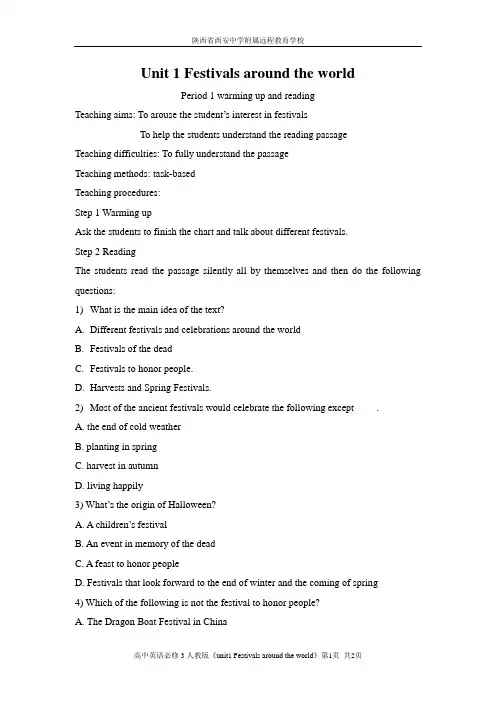
Unit 1 Festivals around the worldPeriod 1 warming up and readingTeaching aims: To arouse the student’s interest in festivalsTo help the students understand the reading passageTeaching difficulties: To fully understand the passageTeaching methods: task-basedTeaching procedures:Step 1 Warming upAsk the students to finish the chart and talk about different festivals.Step 2 ReadingThe students read the passage silently all by themselves and then do the following questions:1)What is the main idea of the text?A.Different festivals and celebrations around the worldB.Festivals of the deadC.Festivals to honor people.D.Harvests and Spring Festivals.2)Most of the ancient festivals would celebrate the following except ____.A. the end of cold weatherB. planting in springC. harvest in autumnD. living happily3) What’s the origin of Halloween?A. A children’s festivalB. An event in memory of the deadC. A feast to honor peopleD. Festivals that look forward to the end of winter and the coming of spring4) Which of the following is not the festival to honor people?A. The Dragon Boat Festival in ChinaB. Columbus Day in USA.C. Mid-Autumn FestivalD. The Day of the Dead in Mexico5) From the passage we know that people love festivals and celebrations because they can ____.A. eat good foodB. be dressed in beautiful clothesC. get lucky money in red paperD. enjoy themselves and relieve stresskeys: ADBCDStep 3 Understanding sentences1)Today’s festivals have many origins, some religious, some seasonal, and somefor special people or events.2)For the Japanese festival Obon, people should go to clean graves and lightincense in memory of their ancestors.3)The Western holiday Halloween also had its origin in old beliefs about thereturn of the spirits of dead people. It is now a children’s festival, when they can dress up and go to their neighbor s’ homes to ask for sweets.4)The most energetic and important festivals are the ones that look forward tothe end of winter and to the coming of spring.5)These carnivals might include parades, dancing in the streets day and night,loud music and colorful clothing of all kinds.6)Easter is an important religious and social festival for Christians around theworld. It celebrates the return of Jesus from the dead and the coming of spring and new life.Step 4 AssignmentWrite an essay around 100 words on what you have learned about festivals according to the passage.。
![必修四 Unit1 Women of achievement-Warming up and Reading[课件]](https://uimg.taocdn.com/8b0b5d1d650e52ea5518984a.webp)
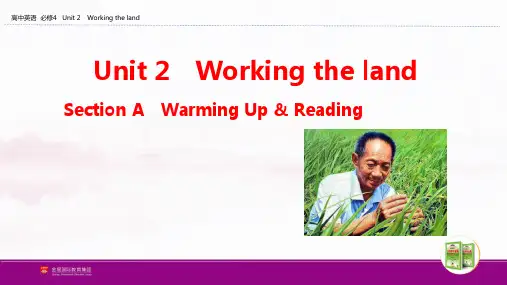
高中英语学习材料***鼎尚图文理制作***Unit 4Astronomy:the science of the stars训练一Warming Up and ReadingⅠ.写出下列单词的正确形式1.violence ______(形容词)2.religious ______(名词)3.like(prep.)______(反义词)4.harm______(形容词)5.astronomer______(名词:天文学)6.explode______(名词)7.disappear ______(名词)8.global______(名词)9.develop______(名词)10.existence______(动词)Ⅱ.把下列短语译成英语或汉语1.in all directions ______2.______及时;迟早3.cool down______4.______也,又;和……一样好5.lay eggs ______6.______ 产生;分娩7.in one's turn______8.______ 阻止;制止9.as a result of...______10.______ 依靠;取决于Ⅲ.单词拼写1.As we climbed up the mountain,the dangers and difficulties ______(增加).2.A solution has not yet been found to the ______(基本的)problems of industrial relations. 3.The gas given off by automobiles is h______ to people's health.4.The present ______(制度)of education needs to be improved.5.It seems good in t______,but it doesn't work in practice.6.Will you help me with this crossword p______?It got me stumped.7.The a______ of the city is very much polluted.8.With the d______ of modern agriculture and industry,our everyday life has improved a lot. 9.G______ speaking,girls are better at learning to speak languages than boys.10.The Chinese government did very well in p______ SARS from spreading.答案:Ⅰ.1.violent 2.religion 3.unlike 4.harmful5.astronomy 6.explosion7.disappearance8.globe9.development10.existⅡ.1.四面八方 2.in time 3.冷却下来;冷静4.as well as 5.下蛋 6.give birth to7.轮到某人;接着8.prevent...from9.由于10.depend onⅢ.1.multiplied 2.fundamental 3.harmful4.system 5.theory 6.puzzle7.atmosphere 8.development9.Generally10.preventing课堂巩固Ⅰ.阅读HOW LIFE BEGAN ON THE EARTH,回答下列问题1.How were stars and other bodies created?A.Atoms combined to create them.B.Clouds of dust combined to create them.C.Water combined to create them.D.Gases combined to create them.2.Which is the most important for life appearing on the earth?A.Fire.B.Rock.C.Water. D.Clouds.3.It can be known from the passage that ______.A.plants and animals appeared on the earth at the same timeB.plants appeared later on the earth than animalsC.early shellfish appeared earlier than plantsD.animals appeared later on the earth than plants4.How many years did dinosaurs exist on the earth?A.More than 140 billion years.B.More than 140 million years.C.More than 140 thousand years.D.More than 140 years.5.Why can the earth become too hot to live on?A.Small clever animals produce more heat.B.Small clever animals produce too much carbon dioxide.C.Small clever animals don't want heat to escape from the earth.D.Small clever animals like to live in a hot planet.Ⅱ.用方框里短语的正确形式填空1.—Did you catch your plane?—Yes,we got there just__________.2.The dish tastes good after it______.3.We are repairing the roof ______painting the walls.4.—Will you go fishing this afternoon?—Well,it all ______the weather.5.Lacey has a back injury that may __________her ______playing in tomorrow's game.6.When school began last summer,most of us met __________.7.Mice scattered __________ when a cat appeared.8.__________ teamwork,they finished the task ahead of time.9.She __________ a fine healthy baby last night in this hospital.10.The soldier managed to __________ the enemy's prison.Ⅲ.选词填空(in time,on time,in no time,at one time,at times,at any time)1.—Why are you in a hurry to leave here?—To get home ______ to bathe the children.2.These buses are never ______ and the passengers are always complaining.3.While I am away,please call me ______ if someone comes to see me.4.You can't imagine this lake used to be a beautiful place in our province ______.5.He rushed out of the kitchen ______ when he heard the shout.6.______ I sit silently and wonder if this kind of job is worth all the effort.答案:Ⅰ.1.A 2.C 3.D 4.B 5.BⅡ.1.in time 2.cools down 3.as well as 4.depends on 5.prevent;from 6.for the first time7.in all directions8.As a result of 9.gave birth to10.escape fromⅢ.1.in time 2.on time 3.at any time4.at one time 5.in no time 6.At times提示:in time“及时”;on time“按时”;in no time“立即,马上”;at one time“曾经”;at times=sometimes“有时”;at any time“在任何时候”。
Establishing a human colony on the Moon and travelling to Mars has been the stuff of dreams since the dawn of the space age.But these visions face many hurdles (障碍). How can humans survive for months or years in the ultra-hostile (极端恶劣的) environment of space? What, for instance, will they eat?Agricultural researchers at a Dutch university say they are taking the first steps towards providing an answer.They are growing vegetables in soils similar to those found on the Moon and Mars, looking for ways of helping space pioneers grow their own crops. “When people go to the Moon and Mars they also have to eat, and it's easiest for them to grow their own food,”said Wieger Wamelink, surrounded by several dozen plants in a special greenhouse at Wageningen, an agricultural university in central Netherlands.“We wanted to use real Martian and lunar soil, to see if plants would actually grow in it,” Wamelink told reporters.Of course, getting real lunar and Martian potting soil is an impossible task. But an Internet search revealed an unlikely supplier: NASA.“The US space agency makes ground similar to that on the Moon from sand found in an Arizona desert, while Mars'crimson ‘soil’is scooped (舀;掏) from a volcano in Hawaii,” Wamelink told reporters.The first experiments started in 2013 after Wageningen received an order of 100 kilograms (220 pounds) of NASA's imitation “space soil” — at a hefty price of 2,000 euros ($2,285).“To work in this soil was very special. Nobody, not even NASA, could tell us what would happen, even just by simply adding water,” he said. The imitation ground at first was a little “reluctant” (勉强的) to absorb water, but soon turned out to be good potting soil.“Especially in the Martian soil, plants were growing very fast and very good. They even started to flower, something that we never anticipated (预料,预见),” Wamelink said.Section_ⅠWarming Up & Reading — Pre-reading[原文呈现]A PIONEER①FOR ALL PEOPLEAlthough he is one of China's most famous scientists, Yuan Longping considers himself a farmer, for he works the land② to do his research. Indeed, his sunburnt③ face and arms andhis slim, strong body are just like those of millions of Chinese farmers, ④for whom he has struggled⑤ for the past five decades⑥. Yuan Longping grows what is called super⑦hybrid⑧rice⑨. In 1973, he became the first agricultural pioneer in the world to grow rice⑩ that has a high output⑪. This special strain⑫of rice makes it possible to produce 20% more of the crop⑬in the same fields⑭. Now more than 60% of the rice produced in China⑮each year is from this hybrid strain.Born in 1930, Yuan Longping graduated from Southwest Agricultural College in 1953. Since then, finding ways to grow more rice⑯has been his life goal. As a young man, he saw the great need for increasing the rice output. At that time, hunger⑰was a disturbing⑱problem in many parts of the countryside. Yuan Longping searched for a way to increase rice harvests without expanding⑲the area of the fields. In 1950, Chinese farmers could produce about fifty-six million tons of rice. In a recent harvest, however, nearly two hundred million tons of rice was produced. These increased harvests⑳mean that 22% of the world's people are fed from just 7% of the farmland in the world. Yuan Longping is now circulating○21his knowledge in India, Vietnam○22and many other less developed countries to increase their rice harvests. Thanks to○23his research, the UN has more tools in the battle○24to rid the world of○25hunger. Using his hybrid rice○26,farmers are producing harvests twice as large as○27before.[读文清障]①pioneer n.开拓者;先锋;先驱②work the land耕种土地work在此处意为“管理,经营,耕种”,是及物动词。